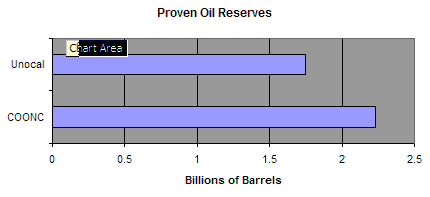CNOOC/Unocal: The “ripple” affect
Posted By RichC on June 23, 2005
As the trade and economic battle between China and the US escalates, the questions begin to arise at the best way to handle the situation. The recent battle over the company Unocal between Chevron and Communist China’s government controlled CNOOC has brought the situation to the forefront. (WSJ Article) The rise cost of oil (today just under $60/barrel) and the increasing demand on the world supply primarily by China new added thirst, is placing an increase concern on the economic health of the United States. Today’s offer of $67.00/ share for Unocal plus a $500 million dollar breakup fee by CNOOC will allow the government controlled Chinese company one more asset in securing addition oil reserves. Is this a security risk to the United States or an asset that will always be available for the right price?

In free markets, this would not be a concern, but in this case an open market company would go under the control of a Communist government. The purchase from China’s standpoint makes sense as the oil fields controlled by Unocal are located primarily in Asia. The securing of these assets by a government are a bit different than the independent controlled companies in a capital system, so there is a concern. My personal thought is that it is difficult for independent capital corporations to compete with governments in acquiring companies.
Today is also a day that tariffs and value of the Yuan to the dollar is being discussed before congress. Greenspan will be a guest speaker and I assume he will not support protectionist tariffs or attempting to ‘force’ change in the valuation of the Yuan to the dollar. As a free market believer, I do agree with Greenspan on this, but in the case of China (unlike Japan in the 1980s) the playing field between privately owned companies in a democracy and the government controlled companies in communist China are not equal. John Snow is also slated to speak to congress and perhaps will enlighten us as to what kinds of talks are going on behind the scenes to keep business flowing between our two countries. I sense an eventual showdown economically between China and the US … and if congress gets involved, they most likely will side on protectionist strategies. (understandable if the points below are valid)
Congress is already getting heat from industries in the US that are attempting to compete for business with Chinese companies. These struggling US companies will cite intellectual property theft, unfair employee practices and abused environmental laws in China and other Asian countries. US citizens as well are concerned with the loss of jobs due to the low labor costs available to companies in China and the increasing economic power of these government controlled companies to acquire US corporations. The problem is not going to go away and will probably continue to escalate unless changes are voluntarily made by China, US citizens question their exacerbating this problem with their buying habits or congress intercedes with pressure, threats or tariffs against Chinese produced products. It is interesting to know which companies our government would allow to going into the hands of the Chinese?
I think most Americans approve of competing where the playing field is level and are concerned only when they personally feel the pain of lost jobs or buying power. Perhaps we are nearing that point when communist governments can gain control of oil reserves (be they only 1%), exploit cheap labor, ignore environmental and copyrights/patents and acquire corporations that control assets vital to our economy and perhaps security? Stay tuned as this Unocal bid might be the “striking of the match”or the “Ripple in the pond.” Let’s just hope its not a tsunami in the making.
Comments